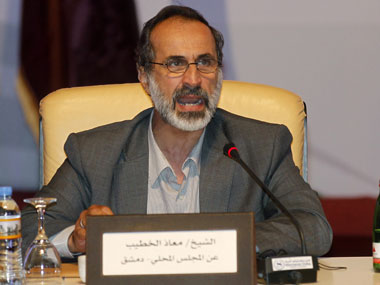Doha: Syria’s fractious opposition finally put aside fierce arguments to rally behind a new leader within a new coalition that its Western and Arab backers hope can topple Bashar al-Assad and take over the country. After days of wrangling in Qatar under constant cajoling by exasperated Arab, US and other officials, representatives of groups including rebel fighters, veteran dissidents and ethnic and religious minorities agreed on Sunday to join a new assembly that can form a government-in-exile. They unanimously elected reformist Damascus cleric Mouaz al-Khatib as its president. [caption id=“attachment_522523” align=“alignleft” width=“380”]  Activist preacher Mouaz al-Khatib speaks the General Assembly of the Syrian National Council in Doha. Reuters[/caption] Khatib, a soft-spoken preacher who was once imam of the ancient Umayyad Mosque in Damascus, immediately called on soldiers to quit the Syrian army and on all sects to unite. “We demand freedom for every Sunni, Alawi, Ismaili (Shi’ite), Christian, Druze, Assyrian … and rights for all parts of the harmonious Syrian people,” he told reporters. It remains to be seen whether the Syrian National Coalition for Opposition and Revolutionary Forces can overcome the mutual suspicions and in-fighting that have weakened the 20-month-old drive to end four decades of rule by President Assad’s family. But for allies who see it emulating Libya’s Transitional National Council, the deal was welcome on a day when Israel fired a missile after a Syrian mortar bomb hit the Golan Heights and Assad’s air force strafed along Turkey’s border. “We will strive from now on to have this new body recognised completely by all parties… as the sole legitimate representative of the Syrian people,” said Prime Minister Sheikh Hamad bin Jassim of Qatar, an important supporter of the rebels. Turkish Foreign Minister Ahmed Davutoglu said there was “no excuse any more” for foreign governments not to support an opposition whose internal divisions had given many pause. The United States had also strongly promoted the plan for the Doha meeting to unite the various factions and, notably, subsume the previously ineffectual Syrian National Council into a wider body that would be more inclusive of minorities from a country of great ethnic and religious diversity. France, a vocal backer of the rebels and which once ruled Syria, hailed the deal. “France will work with its partners to secure international recognition of this new entity as the representative of the aspirations of the Syrian people,” Foreign Minister Laurent Fabius said in a statement in which he called the Assad government “the criminal regime in Damascus”. Twenty months after street demonstrations inspired by the Arab Spring drew a military response from Assad, his enemies hope a more cohesive opposition can break a stalemate in the civil war and win more military and diplomatic support from allies who have been wary of the influence of anti-Western militants, some of them linked to al Qaeda. While there has been renewed talk in Turkey and elsewhere of providing some sort of no-fly zones or other protection for refugees and the lightly armed rebels facing Assad’s air force, Western governments have shown little appetite for new military ventures in such a complex Arab state. And Russia and China, which have blocked previous moves against Assad in the United Nations Security Council, are unlikely swiftly to alter positions which call for dialogue with Assad and view opposition groups as being in thrall to the West. Regional power Iran, in whose Shi’ite brand of Islam Assad’s Alawite minority has its religious roots, remains firmly behind the president in a conflict which pits him against majority Sunni Muslims supported by Iran’s Sunni Arab adversaries. Reuters
Representatives of groups including rebel fighters, veteran dissidents and ethnic and religious minorities agreed to join a new assembly that can form a government-in-exile.
Advertisement
End of Article
Written by FP Archives
see more


)

)
)
)
)
)
)
)
)



